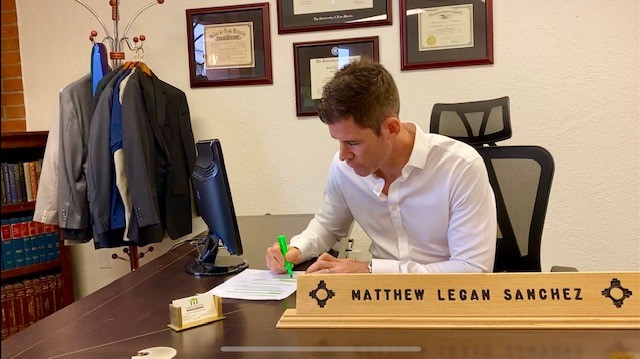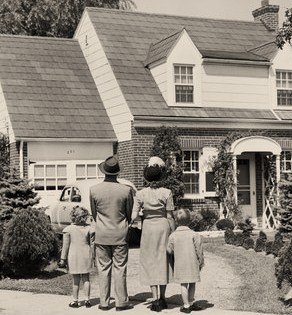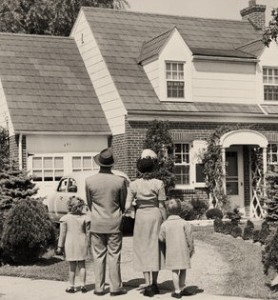CAN YOU KEEP THE MARITAL HOME IN YOUR DIVORCE?
For many Americans, the idea of owning a home is the most tangible embodiment of the “American Dream.” Unfortunately, this American Dream can quickly turn into a Nightmare when divorce looms on the horizon and the couple is forced to decide what will happen to their little slice of the American Pie.
One of the most contentious aspects of divorce surrounds the marital residence. In many instances the marital residence is the couples’ most valuable asset that must be divided upon divorce. Ultimately the couple needs to decide what will happen with the home that is loaded with memories, experiences and possibly even value.
Generally speaking, homes that were purchased during the marriage with community funds are considered community property. “Community funds” means any money earned during the marriage, but excludes: (1) Inheritances (2) Gifts, and (3) Personal injury settlements for pain and suffering that are received during the marriage.
Because New Mexico is a community property state, if the home meets the requirements above, then the home is community property and any debt or equity (value) in the home will be split 50-50 upon divorce.
On the other hand, if the home was purchased before the marriage, or during the marriage with separate funds, then the home is considered one’s separate property. Nevertheless, even if the home is one’s separate property, when the home increases in value during the marriage due to community labor or community funds being placed into the home, this increased value can be considered community property. For more information on how separate property can become community property, click here: How Separate Property becomes Community.
Determining the best financial option on how the home will be separated after the divorce is often a stressful decision. This difficult decision usually falls under one of three categories:
1. One Person Stays in the Home and Refinances
In this situation one person stays in the home, refinances the home in their name alone, and the other party signs a “Quitclaim Deed” relinquishing any interest in the home.
In this situation, the home’s equity or debt is taken into consideration, and the person remaining in the home generally either pays a lump sum amount for the other person’s interest in the home, or waives their interest in other property/assets (such as 401k, Spousal Support, etc.) in exchange for the other parties’ share of equity in the home.
This option requires one to answer several questions:
A. Do you want to remain in a home that is loaded with memories and sentimental value?
B. Can you re-finance the home in your name alone?
C. Can you afford the monthly costs associated with the home (Taxes, Mortgage Payments, Maintenance, Repairs, Landscaping, etc.)?
Did you answer yes to all three questions above? If you answered yes to all three, then the choice of staying in the home is a viable option to be considered when determining what will happen to your home. If you answered no to any of the three questions above, then what happens to the marital home will probably fall under the following two options:
2. Sell the Home and Split the Equity/Debt
This option is relatively straightforward. In this situation the parties’ sell the home and split any equity or debt.
On the rainy side of the spectrum, the couple possibly bought the home at the top of the housing bubble and now find themselves underwater with their loan. Another common situation is that the couple recently purchased the home and any equity in the home is offset by the costs associated with the proposed sell. In these situations any debt in the home will be split between the parties.
On the sunny side, the home’s value exceeds the debt plus any costs associated with the sale. In this situation, any money remaining after the sale will be split between the parties.
3. Walk Away from the Home
As children, the idea of never giving up is drilled into our heads over and over and over. Throughout life we are continually told to finish what we start, quitters never win, and winners never quit.
At times this childhood wisdom is simply wrong. When it comes to home ownership sometimes it’s a wise decision to stop payments on your mortgage.
In situations where the home’s debt far exceeds the value, foreclosure can be the best option for many reasons.
First, even when the foreclosure is uncontested, in the quickest of situations it will still take the bank several months to finalize all of the paperwork necessary to complete the lengthy foreclosure process. The time involved with the foreclosure can also be substantially delayed if the borrower contests the action, seeks delays and adjournments of hearings, or files for bankruptcy.
Secondly, even after the bank completes the requisite foreclosure, New Mexico law then provides the home owner with a “right of redemption” that grants the owner an additional period of nine months to reclaim the property.
At times it can take years for the foreclosure and redemption period to be completed. During this lengthy period of time the owners of the home can remain in the home without making any payments. This valuable stretch of time can provide home owners with the opportunity to save a considerable amount of money before they are legally forced to leave the home.
(505) SANCHEZ IS HERE TO ANSWER YOUR QUESTIONS ABOUT WHAT HAPPENS TO A HOUSE IN DIVORCE?
Do you still have questions about what happens to a house in divorce? Community property and divorce in Albuquerque often require the experienced hand and knowledge that comes with years of courtroom practice. Matthew Legan Sanchez has the experience needed to handle your unique case. Sanchez can be reached by calling (505) SANCHEZ.

New Mexico divorce division of property








